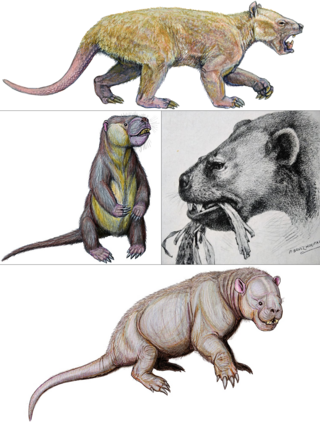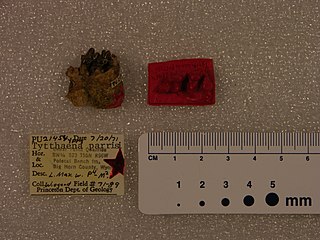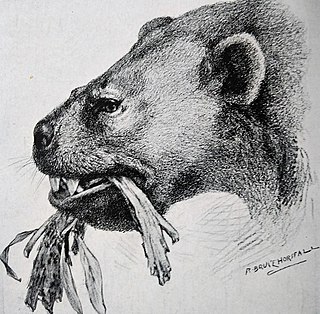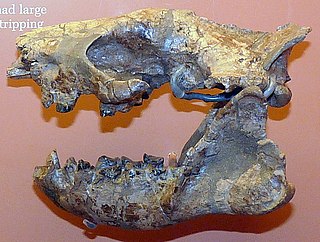
Robert Milton Schoch is an American associate professor of Natural Sciences at the College of General Studies, Boston University. Following initial work as a vertebrate paleontologist, Schoch co-authored and expanded the fringe Sphinx water erosion hypothesis since 1990, and is the author of several pseudohistorical and pseudoscientific books.

Cimolesta is an extinct order of non-placental eutherian mammals. Cimolestans had a wide variety of body shapes, dentition and lifestyles, though the majority of them were small to medium-sized general mammals that bore superficial resemblances to rodents, lagomorphs, mustelids, and marsupials.

Taeniodonta is an extinct order of eutherian mammals, that lived in North America and Europe from the late Cretaceous (Maastrichtian) to middle Eocene.

Stylinodontidae is an extinct family of mammals from extinct superfamily Stylinodontoidea within extinct order Taeniodonta, that lived in North America from the early Paleocene to middle Eocene.

Stylinodon is an extinct genus of taeniodonts from extinct tribe Stylinodontini within subfamily Stylinodontinae and family Stylinodontidae, that lived in North America from early to middle Eocene.

Cimolestes is a genus of early eutherians with a full complement of teeth adapted for eating insects and other small animals. Paleontologists have disagreed on its relationship to other mammals, in part because quite different animals were assigned to the genus, making Cimolestes a grade taxon of animals with similar features rather than a genus of closely related ones. Fossils have been found in North America, South America, Europe and Africa. Cimolestes first appeared during the Late Cretaceous of North America. According to some paleontologists, Cimolestes died out at the start of the Paleocene, while others report the genus from the early Eocene.

Didymictis is an extinct genus of placental mammals from extinct subfamily Didymictinae within extinct family Viverravidae, that lived in North America and Europe from the late Paleocene to middle Eocene.

Raphictis is an extinct genus of placental mammals from extinct subfamily Didymictinae within extinct family Viverravidae, that lived in North America during late Paleocene.

Psittacotherium is an extinct genus of taeniodonts from extinct tribe Psittacotheriini within subfamily Stylinodontinae and family Stylinodontidae, that lived in North America from early to late Paleocene. With a weight between 35.6 kg (78 lb) and 71.2 kg (157 lb), and length of 1.125 m, it had similar size of a large dog.

Tillodontia is an extinct suborder of eutherian mammals known from the Early Paleocene to Late Eocene of China, the Late Paleocene to Middle Eocene of North America where they display their maximum species diversity, the Middle Eocene of Pakistan, and the Early Eocene of Europe. Leaving no descendants, they are most closely related to the pantodonts, another extinct group. The tillodonts were medium- to large-sized animals that probably fed on roots and tubers in temperate to subtropical habitats.

The Wasatch Formation (Tw) is an extensive highly fossiliferous geologic formation stretching across several basins in Idaho, Montana, Wyoming, Utah and western Colorado. It preserves fossils dating back to the Early Eocene period. The formation defines the Wasatchian or Lostcabinian, a period of time used within the NALMA classification, but the formation ranges in age from the Clarkforkian to Bridgerian.

The San Jose Formation is an Early Eocene geologic formation in the San Juan Basin of New Mexico and Colorado.

Prolimnocyon is an extinct paraphyletic genus of limnocyonid hyaenodonts that lived in Asia and North America during the late Paleocene to middle Eocene. Prolimnocyon chowi is the earliest known member of the hyaenodontid family Limnocyonidae.

Tytthaena is an extinct genus of placental mammals from extinct subfamily Tytthaeninae within extinct family Oxyaenidae, that lived in North America from the late Paleocene to early Eocene.
Wyonycteris is a genus of small mammals that existed in the late Paleocene and early Eocene epochs. The type species is Wyonycteris chalix, which lived in Wyoming during the Clarkforkian North American Land Mammal Age of the Paleocene and was originally proposed to be an early form of insectivorous bat. Later re-examination of the material has put this alliance in doubt, and the genus has instead been proposed as belonging to the subfamily Placentidentinae, within the family Nyctitheriidae. Similar fossil material of the same time period found in Europe was later discovered and described as new species, Wyonycteris richardi.

Ectoganus is an extinct genus of taeniodonts from tribe Ectoganini within subfamily Stylinodontinae and family Stylinodontidae, that lived in North America from late Paleocene to early Eocene.

Metacheiromyidae is an extinct paraphyletic family of myrmecophagous placental mammals within extinct order Palaeanodonta, that lived in North America and Europe from the late Paleocene to middle Eocene.

Conoryctidae is an extinct family of mammals from extinct order Taeniodonta, that lived in North America and Europe from the early Paleocene to early Eocene.

Conoryctinae is an extinct subfamily of taeniodonts from extinct family Conoryctidae, that lived in North America from the early to middle Paleocene.

Wortmania is an extinct genus of taeniodonts from extinct subfamily Wortmaniinae within extinct family Stylinodontidae, that lived in North America during the early Paleocene.




















